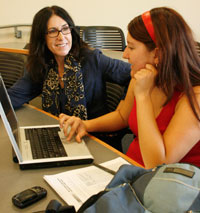Overview
Cognitive Science is the interdisciplinary study of human thought and behavior. It combines methods, theories, and applications from many disciplines, including philosophy, psychology, linguistics, computer science, neuroscience and biology.
The Cognitive Science majors, B.A. and B.S., provide a broad knowledge of cognitive science, including language and communication, reasoning, memory, categorization, cognitive modeling, perception and action, philosophical foundations, artificial intelligence, cognitive engineering and cognitive science applications for the business setting.
A degree in Cognitive Science provides in-depth training in research methods, data analysis, modeling and lab-based research, and it provides excellent training for jobs in high-tech companies. It is ideal for students who want to pursue graduate work in cognitive science, neuroscience, psychology, computer science and engineering, information sciences and information management, communications, medicine, business, management, law and education.
Students can work with cognitive science faculty members to tailor their own programs of study to emphasize one or two specific areas within cognitive science. Example specializations include behavioral experiments, cognitive neuroscience, computational modeling, decision sciences, linguistics and philosophy of cognitive science.
Program Learning Outcomes
Upon graduation, students who major and minor in Cognitive Science will be able to:
- Explain and apply knowledge of landmark findings and theories in cognitive science;
- Design, interpret and evaluate simple behavioral and neuroscientific experiments;
- Interpret and appreciate formal and computational approaches in cognitive science;
- Argue for or against theoretical positions in cognitive science; and
- Use a cognitive science education outside the undergraduate classroom, particularly in the service of careers.
Refer to the Curriculum Map to see the coherency between the Program Learning Outcomes and our course offerings.
Program Assessment Results
Each year, our program assesses the classroom learning experiences of students to ensure students are building the necessary skills and knowledge-base in this discipline. The assessments allow our program to engage in continued creative and visionary curriculum and instruction approaches that ensure students are exposed to rigorous undergraduate training. Every discipline has a unique assessment schema and set of student performance benchmarks, reflecting the priorities of the discipline.
- In the 2011-2012 academic year, we piloted a sampling from the student work of six graduating seniors and eight juniors from an upper-division course in the major. Student sample work was evaluated using a rubric outlining the knowledge and skills to argue for or against theoretical positions in cognitive sciences (PLO4, listed above).
- More than 90 percent of the papers were judged to have achieved an overall score of moderate proficiency or better.
- In a self-reporting survey designed by COGS and administered by SATAL, 70 percent (12/17) of junior and senior respondents reported that they started college with little or no knowledge of theoretical positions in Cognitive Science.
- In this same survey, students also indicated that in order to perform better on PLO4 they could benefit from increased study time outside of class and attending office hours more frequently.
The conclusions that we draw inform our learning support strategies and assessment protocols. First, a minority of students need more learning support around theoretical positions in cognitive science to reach our high expectations. Second, the scoring rubric and survey worked well to collect the information we sought and we will implement the protocols on a larger scale in the next round of assessment.
Alumni Success
Student graduates from our program are currently engaging in graduate studies and careers. A few of these after-college endeavors are listed below.
- Congratulations to Zach Tosi, who was admitted to an IGERT Ph.D. Fellowship Program in Cognitive Science at Indiana University for Fall 2012.
Graduate School
Student graduates from COGS are studying at the University of California, Berkeley, University of California, Davis, University of San Francisco and Notre Dame de Namur University.
Careers
Student graduates from COGS are working in a variety of professional settings including as university administrators in development and information technology and as managers in companies that contribute to California’s infrastructure.
Last Updated: May 2016



